Exploring Employee Motivation Strategies in the Hospitality Industry
VerifiedAdded on 2020/05/16
|22
|5797
|372
AI Summary
The research paper delves into the critical aspect of employee motivation within the hospitality industry. It investigates both intrinsic and extrinsic motivational strategies and their effects on employee performance and overall hotel operations. By analyzing various studies, such as those by Chang and Teng (2017) and Putra et al. (2017), the paper highlights how management practices can influence staff engagement and service quality. The study underscores the importance of aligning organizational goals with individual objectives to enhance motivation and reduce workplace negativity. It also discusses practical approaches for managers to foster a supportive work environment, emphasizing continuous dialogue and recognition of employee contributions. Ultimately, the research provides actionable insights for improving employee satisfaction and boosting hotel performance through effective motivational strategies.
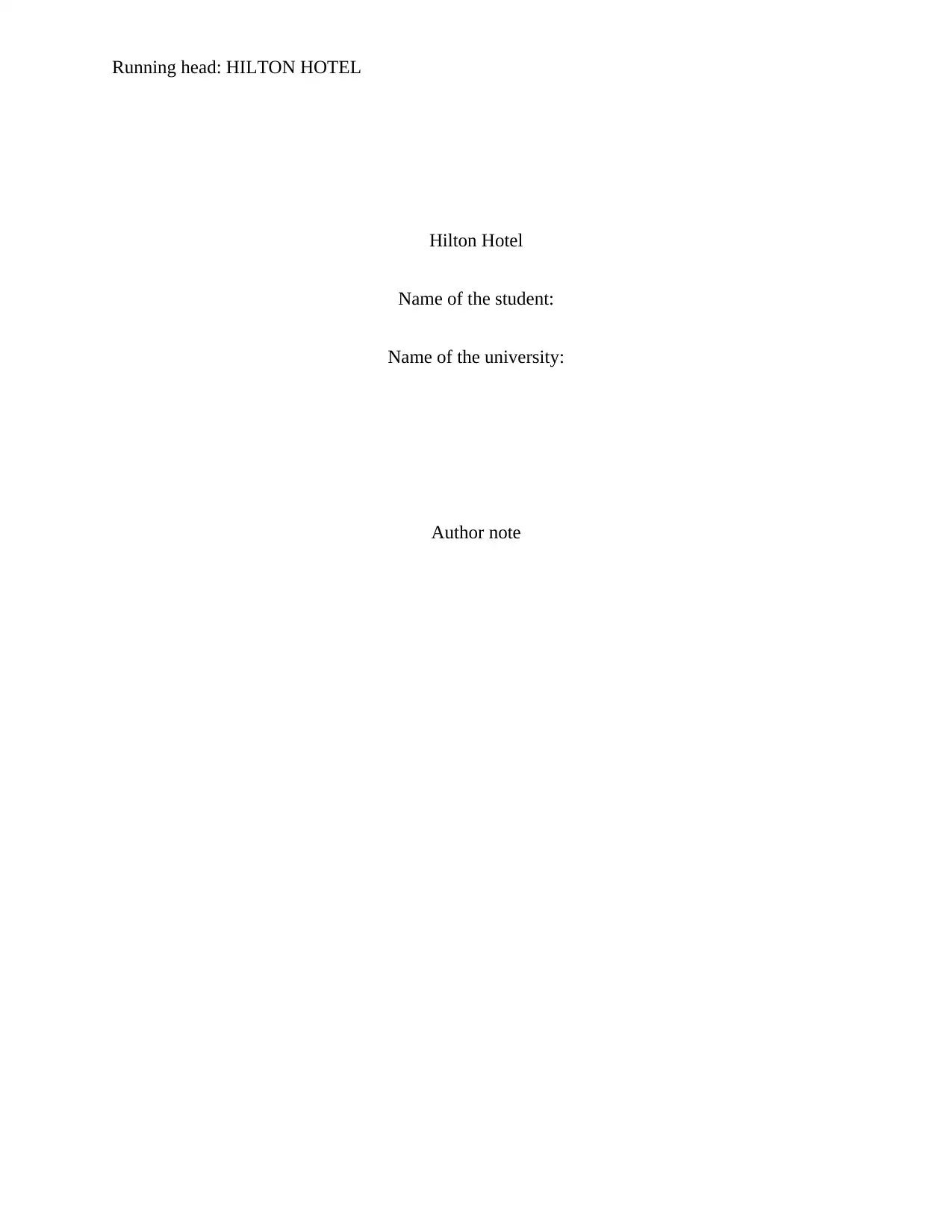
Running head: HILTON HOTEL
Hilton Hotel
Name of the student:
Name of the university:
Author note
Hilton Hotel
Name of the student:
Name of the university:
Author note
Paraphrase This Document
Need a fresh take? Get an instant paraphrase of this document with our AI Paraphraser
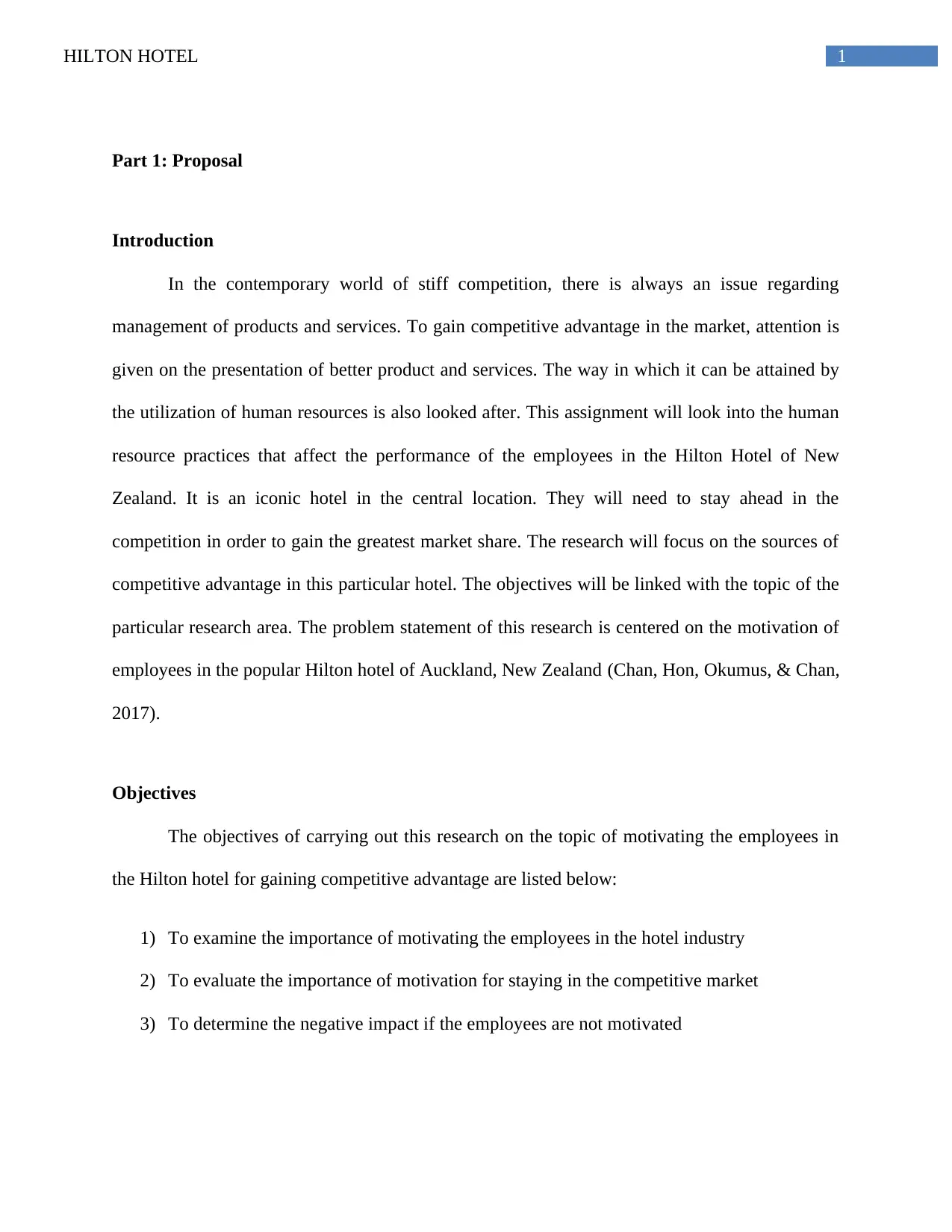
1HILTON HOTEL
Part 1: Proposal
Introduction
In the contemporary world of stiff competition, there is always an issue regarding
management of products and services. To gain competitive advantage in the market, attention is
given on the presentation of better product and services. The way in which it can be attained by
the utilization of human resources is also looked after. This assignment will look into the human
resource practices that affect the performance of the employees in the Hilton Hotel of New
Zealand. It is an iconic hotel in the central location. They will need to stay ahead in the
competition in order to gain the greatest market share. The research will focus on the sources of
competitive advantage in this particular hotel. The objectives will be linked with the topic of the
particular research area. The problem statement of this research is centered on the motivation of
employees in the popular Hilton hotel of Auckland, New Zealand (Chan, Hon, Okumus, & Chan,
2017).
Objectives
The objectives of carrying out this research on the topic of motivating the employees in
the Hilton hotel for gaining competitive advantage are listed below:
1) To examine the importance of motivating the employees in the hotel industry
2) To evaluate the importance of motivation for staying in the competitive market
3) To determine the negative impact if the employees are not motivated
Part 1: Proposal
Introduction
In the contemporary world of stiff competition, there is always an issue regarding
management of products and services. To gain competitive advantage in the market, attention is
given on the presentation of better product and services. The way in which it can be attained by
the utilization of human resources is also looked after. This assignment will look into the human
resource practices that affect the performance of the employees in the Hilton Hotel of New
Zealand. It is an iconic hotel in the central location. They will need to stay ahead in the
competition in order to gain the greatest market share. The research will focus on the sources of
competitive advantage in this particular hotel. The objectives will be linked with the topic of the
particular research area. The problem statement of this research is centered on the motivation of
employees in the popular Hilton hotel of Auckland, New Zealand (Chan, Hon, Okumus, & Chan,
2017).
Objectives
The objectives of carrying out this research on the topic of motivating the employees in
the Hilton hotel for gaining competitive advantage are listed below:
1) To examine the importance of motivating the employees in the hotel industry
2) To evaluate the importance of motivation for staying in the competitive market
3) To determine the negative impact if the employees are not motivated
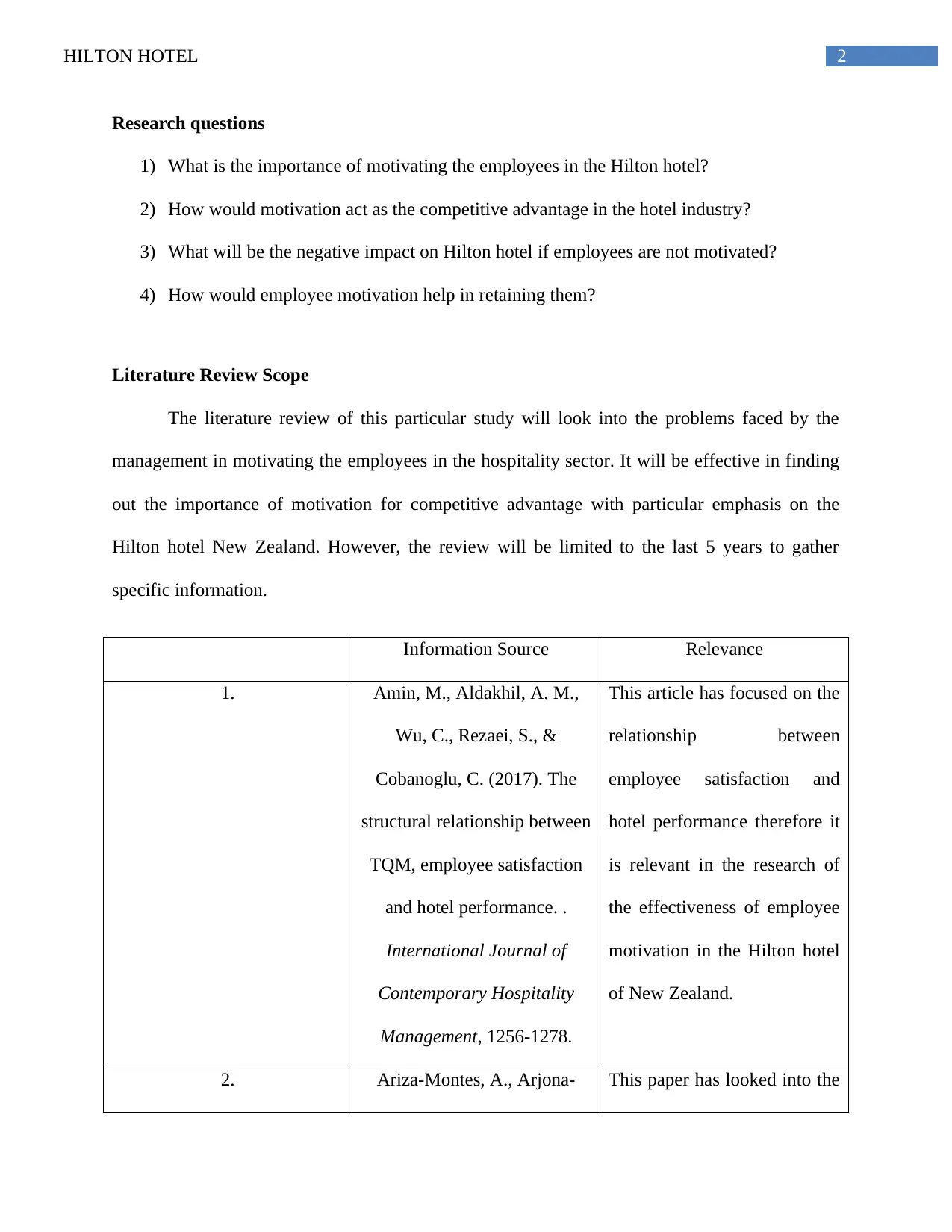
2HILTON HOTEL
Research questions
1) What is the importance of motivating the employees in the Hilton hotel?
2) How would motivation act as the competitive advantage in the hotel industry?
3) What will be the negative impact on Hilton hotel if employees are not motivated?
4) How would employee motivation help in retaining them?
Literature Review Scope
The literature review of this particular study will look into the problems faced by the
management in motivating the employees in the hospitality sector. It will be effective in finding
out the importance of motivation for competitive advantage with particular emphasis on the
Hilton hotel New Zealand. However, the review will be limited to the last 5 years to gather
specific information.
Information Source Relevance
1. Amin, M., Aldakhil, A. M.,
Wu, C., Rezaei, S., &
Cobanoglu, C. (2017). The
structural relationship between
TQM, employee satisfaction
and hotel performance. .
International Journal of
Contemporary Hospitality
Management, 1256-1278.
This article has focused on the
relationship between
employee satisfaction and
hotel performance therefore it
is relevant in the research of
the effectiveness of employee
motivation in the Hilton hotel
of New Zealand.
2. Ariza-Montes, A., Arjona- This paper has looked into the
Research questions
1) What is the importance of motivating the employees in the Hilton hotel?
2) How would motivation act as the competitive advantage in the hotel industry?
3) What will be the negative impact on Hilton hotel if employees are not motivated?
4) How would employee motivation help in retaining them?
Literature Review Scope
The literature review of this particular study will look into the problems faced by the
management in motivating the employees in the hospitality sector. It will be effective in finding
out the importance of motivation for competitive advantage with particular emphasis on the
Hilton hotel New Zealand. However, the review will be limited to the last 5 years to gather
specific information.
Information Source Relevance
1. Amin, M., Aldakhil, A. M.,
Wu, C., Rezaei, S., &
Cobanoglu, C. (2017). The
structural relationship between
TQM, employee satisfaction
and hotel performance. .
International Journal of
Contemporary Hospitality
Management, 1256-1278.
This article has focused on the
relationship between
employee satisfaction and
hotel performance therefore it
is relevant in the research of
the effectiveness of employee
motivation in the Hilton hotel
of New Zealand.
2. Ariza-Montes, A., Arjona- This paper has looked into the
⊘ This is a preview!⊘
Do you want full access?
Subscribe today to unlock all pages.

Trusted by 1+ million students worldwide
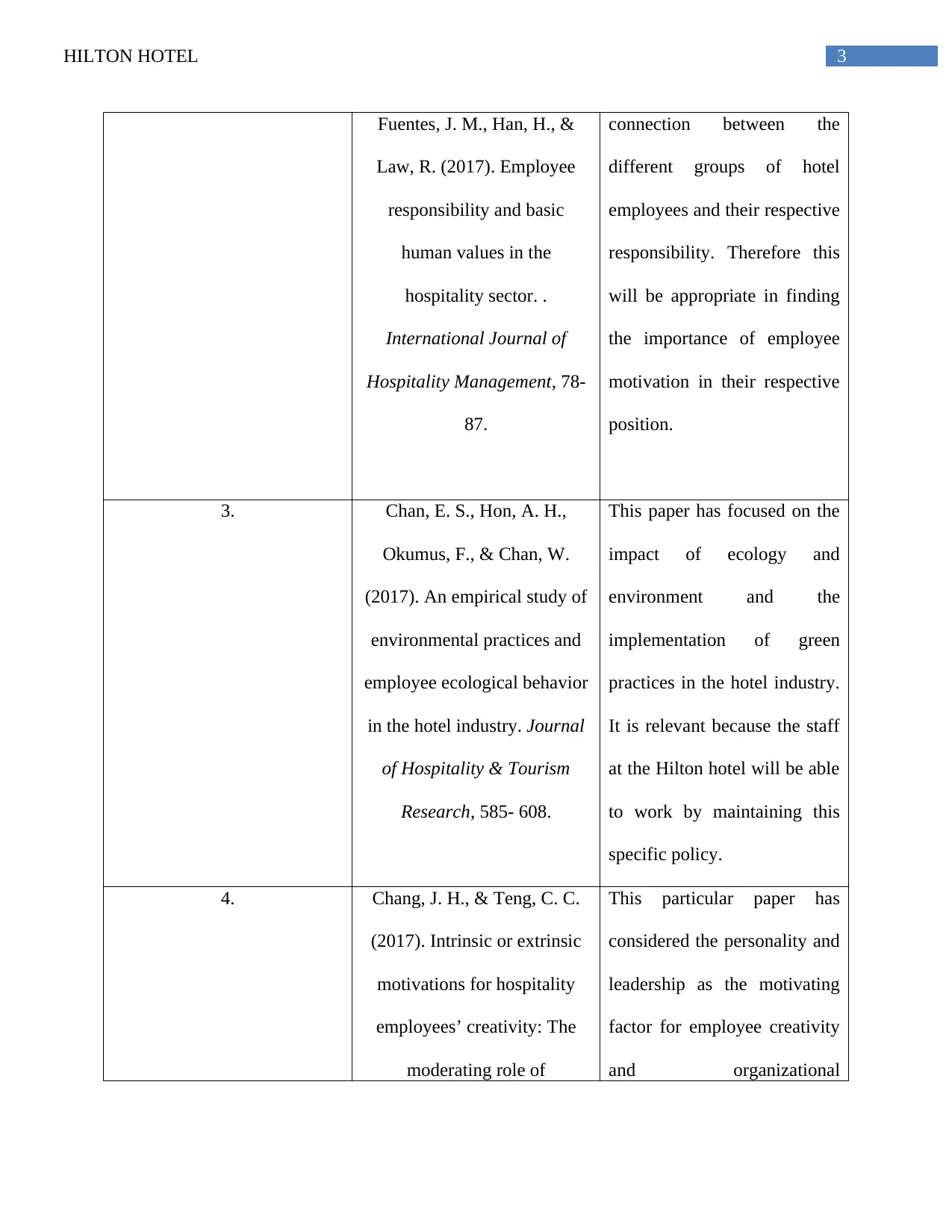
3HILTON HOTEL
Fuentes, J. M., Han, H., &
Law, R. (2017). Employee
responsibility and basic
human values in the
hospitality sector. .
International Journal of
Hospitality Management, 78-
87.
connection between the
different groups of hotel
employees and their respective
responsibility. Therefore this
will be appropriate in finding
the importance of employee
motivation in their respective
position.
3. Chan, E. S., Hon, A. H.,
Okumus, F., & Chan, W.
(2017). An empirical study of
environmental practices and
employee ecological behavior
in the hotel industry. Journal
of Hospitality & Tourism
Research, 585- 608.
This paper has focused on the
impact of ecology and
environment and the
implementation of green
practices in the hotel industry.
It is relevant because the staff
at the Hilton hotel will be able
to work by maintaining this
specific policy.
4. Chang, J. H., & Teng, C. C.
(2017). Intrinsic or extrinsic
motivations for hospitality
employees’ creativity: The
moderating role of
This particular paper has
considered the personality and
leadership as the motivating
factor for employee creativity
and organizational
Fuentes, J. M., Han, H., &
Law, R. (2017). Employee
responsibility and basic
human values in the
hospitality sector. .
International Journal of
Hospitality Management, 78-
87.
connection between the
different groups of hotel
employees and their respective
responsibility. Therefore this
will be appropriate in finding
the importance of employee
motivation in their respective
position.
3. Chan, E. S., Hon, A. H.,
Okumus, F., & Chan, W.
(2017). An empirical study of
environmental practices and
employee ecological behavior
in the hotel industry. Journal
of Hospitality & Tourism
Research, 585- 608.
This paper has focused on the
impact of ecology and
environment and the
implementation of green
practices in the hotel industry.
It is relevant because the staff
at the Hilton hotel will be able
to work by maintaining this
specific policy.
4. Chang, J. H., & Teng, C. C.
(2017). Intrinsic or extrinsic
motivations for hospitality
employees’ creativity: The
moderating role of
This particular paper has
considered the personality and
leadership as the motivating
factor for employee creativity
and organizational
Paraphrase This Document
Need a fresh take? Get an instant paraphrase of this document with our AI Paraphraser
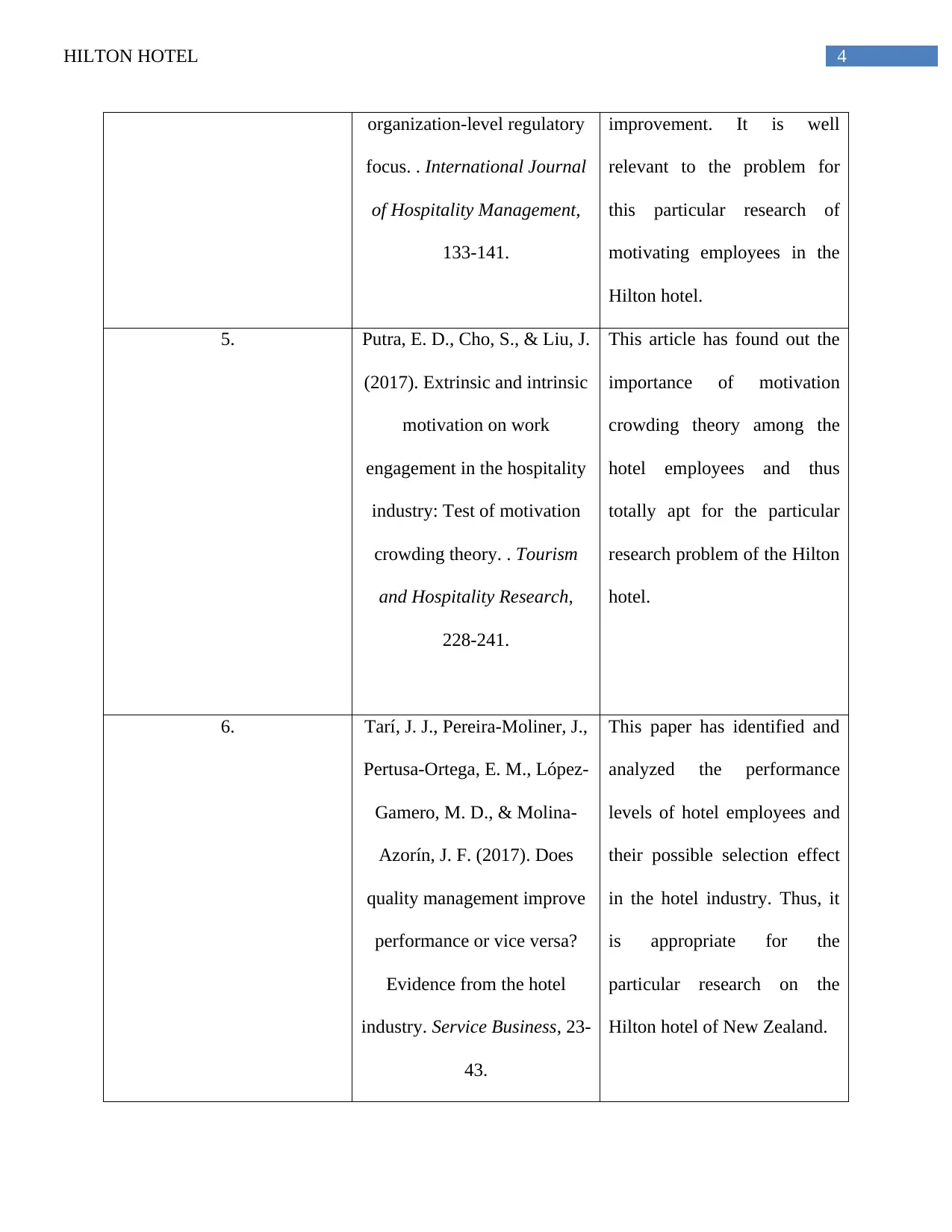
4HILTON HOTEL
organization-level regulatory
focus. . International Journal
of Hospitality Management,
133-141.
improvement. It is well
relevant to the problem for
this particular research of
motivating employees in the
Hilton hotel.
5. Putra, E. D., Cho, S., & Liu, J.
(2017). Extrinsic and intrinsic
motivation on work
engagement in the hospitality
industry: Test of motivation
crowding theory. . Tourism
and Hospitality Research,
228-241.
This article has found out the
importance of motivation
crowding theory among the
hotel employees and thus
totally apt for the particular
research problem of the Hilton
hotel.
6. Tarí, J. J., Pereira-Moliner, J.,
Pertusa-Ortega, E. M., López-
Gamero, M. D., & Molina-
Azorín, J. F. (2017). Does
quality management improve
performance or vice versa?
Evidence from the hotel
industry. Service Business, 23-
43.
This paper has identified and
analyzed the performance
levels of hotel employees and
their possible selection effect
in the hotel industry. Thus, it
is appropriate for the
particular research on the
Hilton hotel of New Zealand.
organization-level regulatory
focus. . International Journal
of Hospitality Management,
133-141.
improvement. It is well
relevant to the problem for
this particular research of
motivating employees in the
Hilton hotel.
5. Putra, E. D., Cho, S., & Liu, J.
(2017). Extrinsic and intrinsic
motivation on work
engagement in the hospitality
industry: Test of motivation
crowding theory. . Tourism
and Hospitality Research,
228-241.
This article has found out the
importance of motivation
crowding theory among the
hotel employees and thus
totally apt for the particular
research problem of the Hilton
hotel.
6. Tarí, J. J., Pereira-Moliner, J.,
Pertusa-Ortega, E. M., López-
Gamero, M. D., & Molina-
Azorín, J. F. (2017). Does
quality management improve
performance or vice versa?
Evidence from the hotel
industry. Service Business, 23-
43.
This paper has identified and
analyzed the performance
levels of hotel employees and
their possible selection effect
in the hotel industry. Thus, it
is appropriate for the
particular research on the
Hilton hotel of New Zealand.
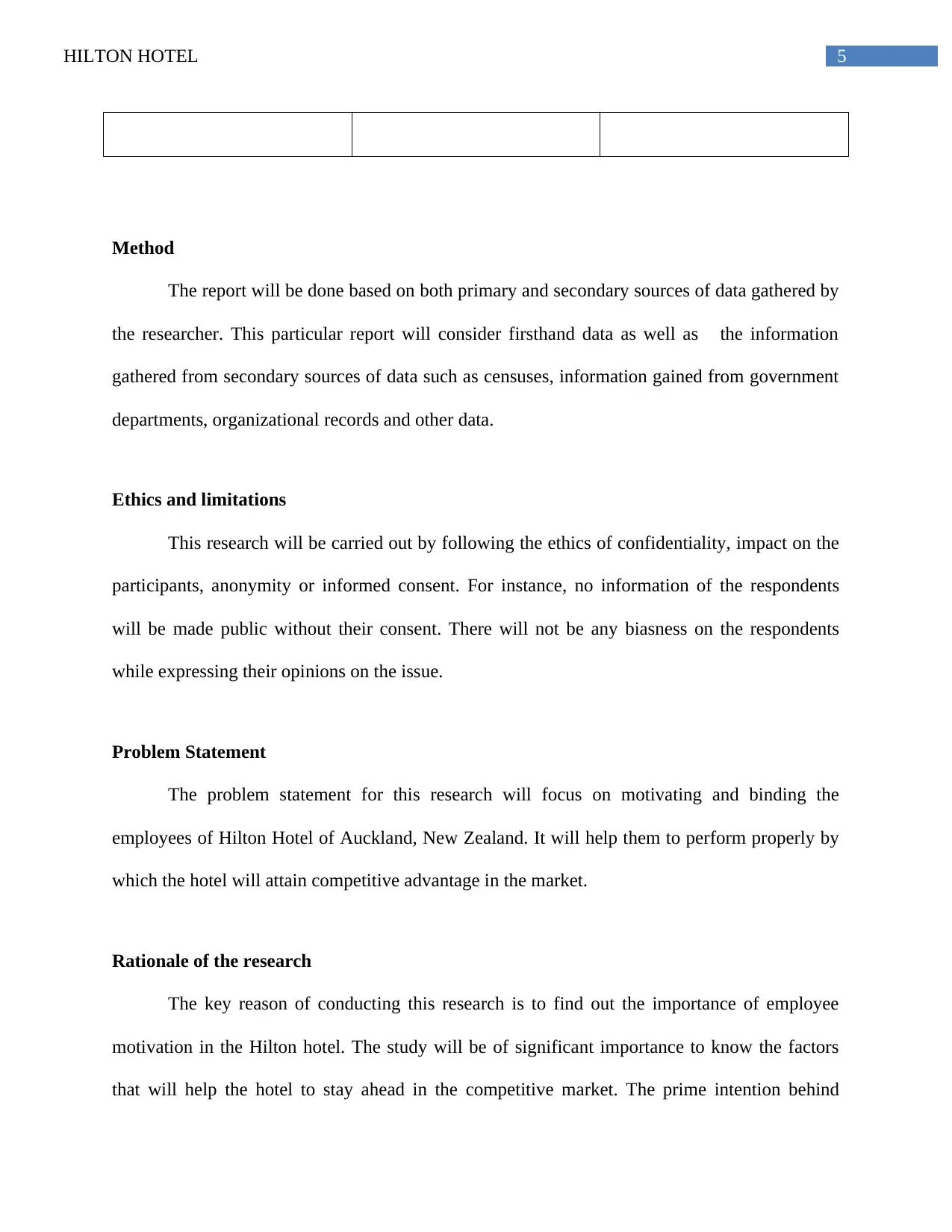
5HILTON HOTEL
Method
The report will be done based on both primary and secondary sources of data gathered by
the researcher. This particular report will consider firsthand data as well as the information
gathered from secondary sources of data such as censuses, information gained from government
departments, organizational records and other data.
Ethics and limitations
This research will be carried out by following the ethics of confidentiality, impact on the
participants, anonymity or informed consent. For instance, no information of the respondents
will be made public without their consent. There will not be any biasness on the respondents
while expressing their opinions on the issue.
Problem Statement
The problem statement for this research will focus on motivating and binding the
employees of Hilton Hotel of Auckland, New Zealand. It will help them to perform properly by
which the hotel will attain competitive advantage in the market.
Rationale of the research
The key reason of conducting this research is to find out the importance of employee
motivation in the Hilton hotel. The study will be of significant importance to know the factors
that will help the hotel to stay ahead in the competitive market. The prime intention behind
Method
The report will be done based on both primary and secondary sources of data gathered by
the researcher. This particular report will consider firsthand data as well as the information
gathered from secondary sources of data such as censuses, information gained from government
departments, organizational records and other data.
Ethics and limitations
This research will be carried out by following the ethics of confidentiality, impact on the
participants, anonymity or informed consent. For instance, no information of the respondents
will be made public without their consent. There will not be any biasness on the respondents
while expressing their opinions on the issue.
Problem Statement
The problem statement for this research will focus on motivating and binding the
employees of Hilton Hotel of Auckland, New Zealand. It will help them to perform properly by
which the hotel will attain competitive advantage in the market.
Rationale of the research
The key reason of conducting this research is to find out the importance of employee
motivation in the Hilton hotel. The study will be of significant importance to know the factors
that will help the hotel to stay ahead in the competitive market. The prime intention behind
⊘ This is a preview!⊘
Do you want full access?
Subscribe today to unlock all pages.

Trusted by 1+ million students worldwide
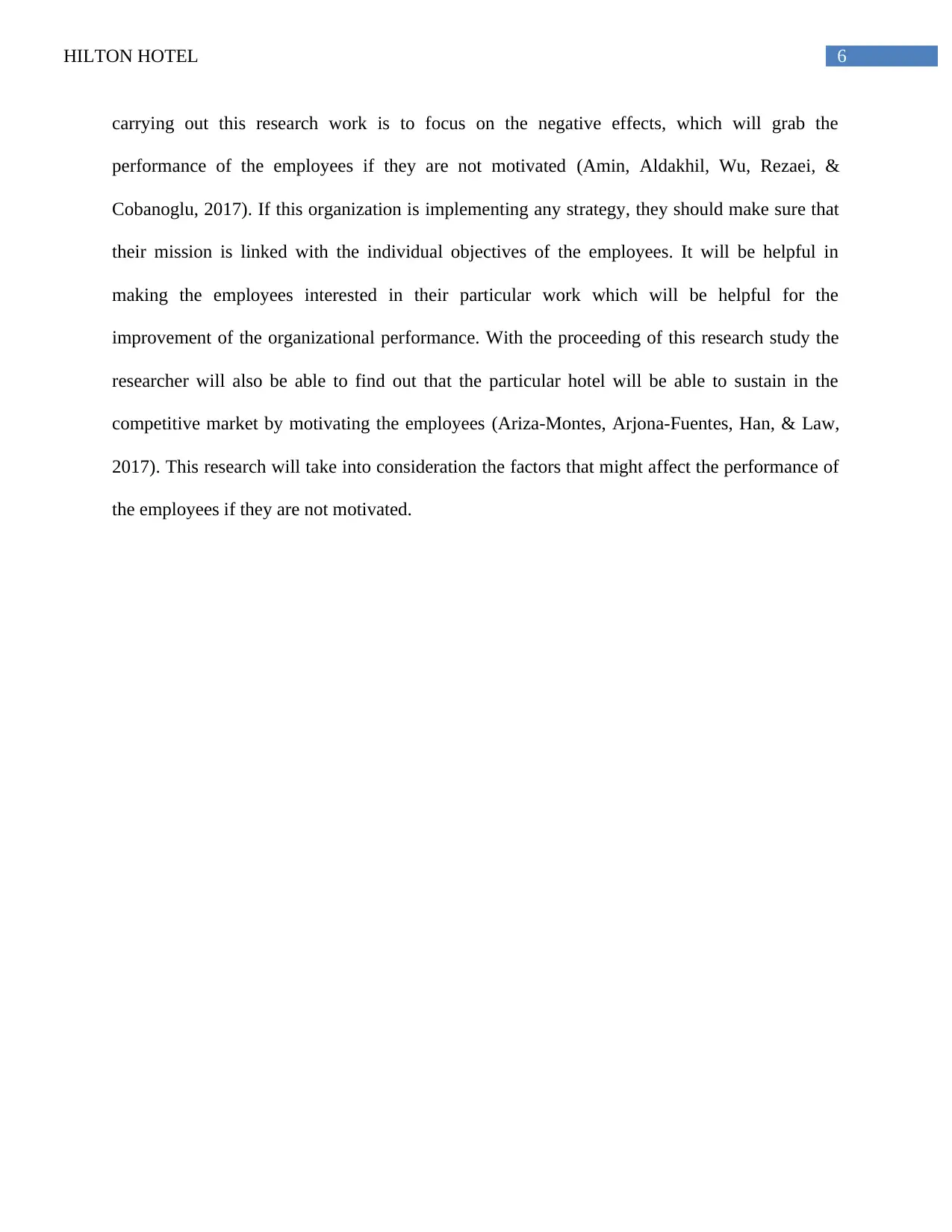
6HILTON HOTEL
carrying out this research work is to focus on the negative effects, which will grab the
performance of the employees if they are not motivated (Amin, Aldakhil, Wu, Rezaei, &
Cobanoglu, 2017). If this organization is implementing any strategy, they should make sure that
their mission is linked with the individual objectives of the employees. It will be helpful in
making the employees interested in their particular work which will be helpful for the
improvement of the organizational performance. With the proceeding of this research study the
researcher will also be able to find out that the particular hotel will be able to sustain in the
competitive market by motivating the employees (Ariza-Montes, Arjona-Fuentes, Han, & Law,
2017). This research will take into consideration the factors that might affect the performance of
the employees if they are not motivated.
carrying out this research work is to focus on the negative effects, which will grab the
performance of the employees if they are not motivated (Amin, Aldakhil, Wu, Rezaei, &
Cobanoglu, 2017). If this organization is implementing any strategy, they should make sure that
their mission is linked with the individual objectives of the employees. It will be helpful in
making the employees interested in their particular work which will be helpful for the
improvement of the organizational performance. With the proceeding of this research study the
researcher will also be able to find out that the particular hotel will be able to sustain in the
competitive market by motivating the employees (Ariza-Montes, Arjona-Fuentes, Han, & Law,
2017). This research will take into consideration the factors that might affect the performance of
the employees if they are not motivated.
Paraphrase This Document
Need a fresh take? Get an instant paraphrase of this document with our AI Paraphraser
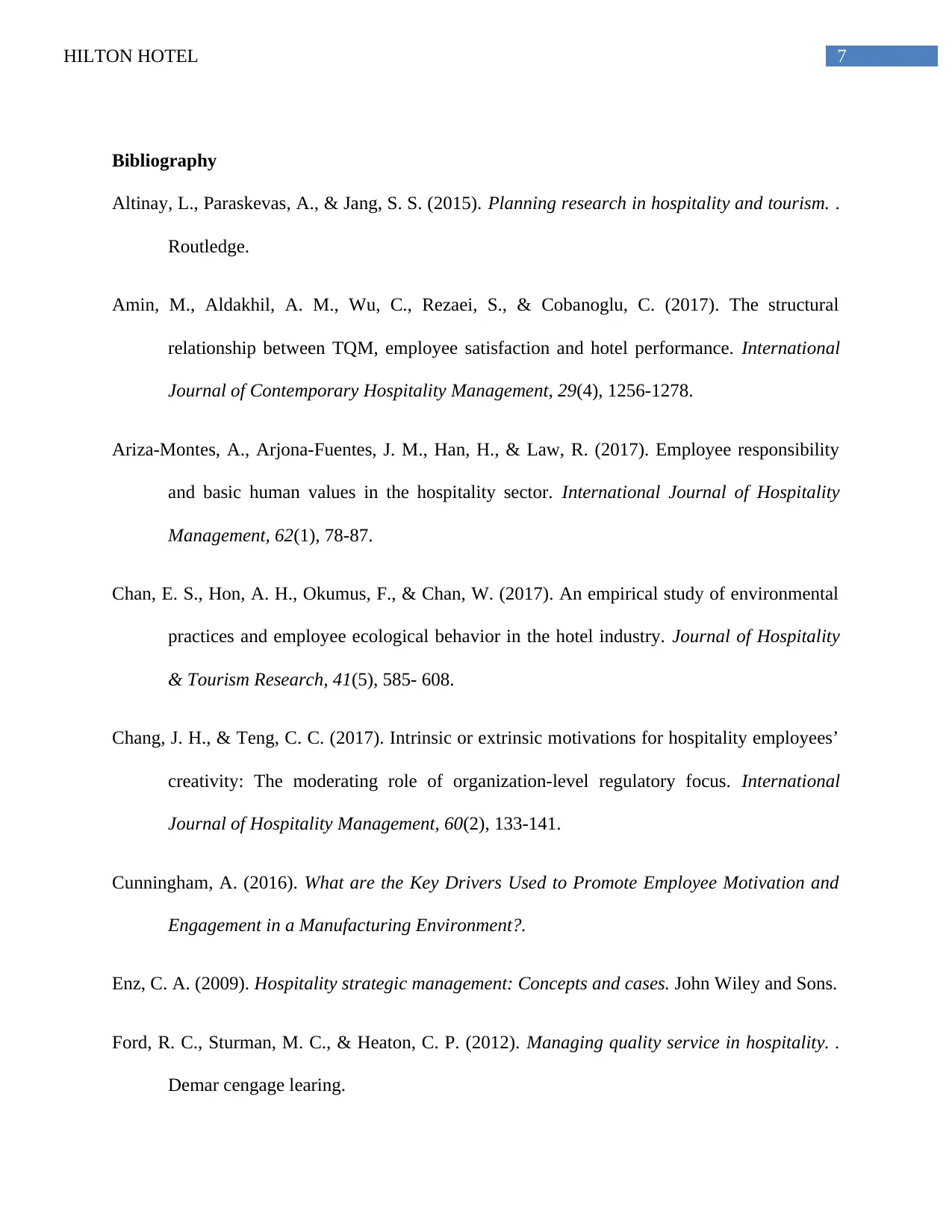
7HILTON HOTEL
Bibliography
Altinay, L., Paraskevas, A., & Jang, S. S. (2015). Planning research in hospitality and tourism. .
Routledge.
Amin, M., Aldakhil, A. M., Wu, C., Rezaei, S., & Cobanoglu, C. (2017). The structural
relationship between TQM, employee satisfaction and hotel performance. International
Journal of Contemporary Hospitality Management, 29(4), 1256-1278.
Ariza-Montes, A., Arjona-Fuentes, J. M., Han, H., & Law, R. (2017). Employee responsibility
and basic human values in the hospitality sector. International Journal of Hospitality
Management, 62(1), 78-87.
Chan, E. S., Hon, A. H., Okumus, F., & Chan, W. (2017). An empirical study of environmental
practices and employee ecological behavior in the hotel industry. Journal of Hospitality
& Tourism Research, 41(5), 585- 608.
Chang, J. H., & Teng, C. C. (2017). Intrinsic or extrinsic motivations for hospitality employees’
creativity: The moderating role of organization-level regulatory focus. International
Journal of Hospitality Management, 60(2), 133-141.
Cunningham, A. (2016). What are the Key Drivers Used to Promote Employee Motivation and
Engagement in a Manufacturing Environment?.
Enz, C. A. (2009). Hospitality strategic management: Concepts and cases. John Wiley and Sons.
Ford, R. C., Sturman, M. C., & Heaton, C. P. (2012). Managing quality service in hospitality. .
Demar cengage learing.
Bibliography
Altinay, L., Paraskevas, A., & Jang, S. S. (2015). Planning research in hospitality and tourism. .
Routledge.
Amin, M., Aldakhil, A. M., Wu, C., Rezaei, S., & Cobanoglu, C. (2017). The structural
relationship between TQM, employee satisfaction and hotel performance. International
Journal of Contemporary Hospitality Management, 29(4), 1256-1278.
Ariza-Montes, A., Arjona-Fuentes, J. M., Han, H., & Law, R. (2017). Employee responsibility
and basic human values in the hospitality sector. International Journal of Hospitality
Management, 62(1), 78-87.
Chan, E. S., Hon, A. H., Okumus, F., & Chan, W. (2017). An empirical study of environmental
practices and employee ecological behavior in the hotel industry. Journal of Hospitality
& Tourism Research, 41(5), 585- 608.
Chang, J. H., & Teng, C. C. (2017). Intrinsic or extrinsic motivations for hospitality employees’
creativity: The moderating role of organization-level regulatory focus. International
Journal of Hospitality Management, 60(2), 133-141.
Cunningham, A. (2016). What are the Key Drivers Used to Promote Employee Motivation and
Engagement in a Manufacturing Environment?.
Enz, C. A. (2009). Hospitality strategic management: Concepts and cases. John Wiley and Sons.
Ford, R. C., Sturman, M. C., & Heaton, C. P. (2012). Managing quality service in hospitality. .
Demar cengage learing.
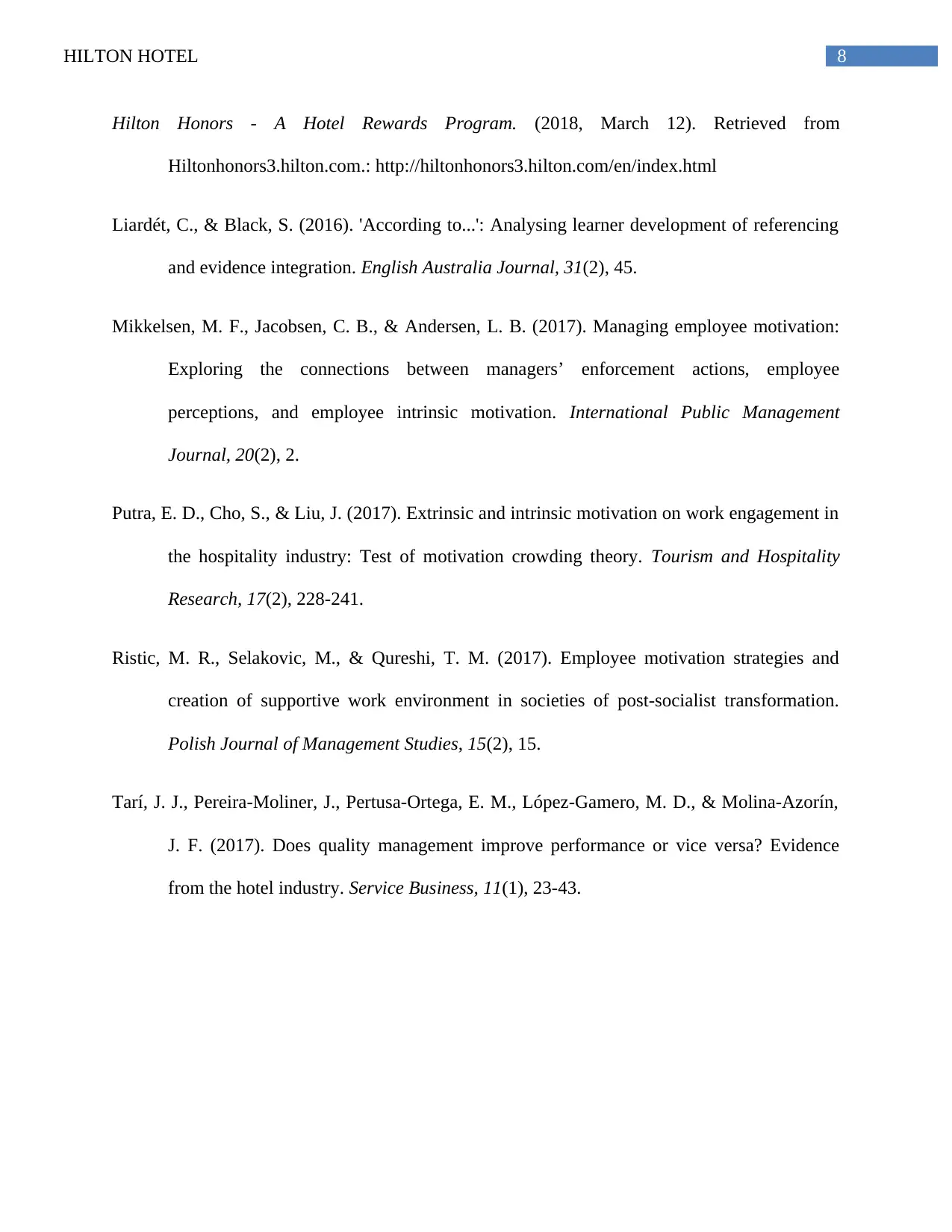
8HILTON HOTEL
Hilton Honors - A Hotel Rewards Program. (2018, March 12). Retrieved from
Hiltonhonors3.hilton.com.: http://hiltonhonors3.hilton.com/en/index.html
Liardét, C., & Black, S. (2016). 'According to...': Analysing learner development of referencing
and evidence integration. English Australia Journal, 31(2), 45.
Mikkelsen, M. F., Jacobsen, C. B., & Andersen, L. B. (2017). Managing employee motivation:
Exploring the connections between managers’ enforcement actions, employee
perceptions, and employee intrinsic motivation. International Public Management
Journal, 20(2), 2.
Putra, E. D., Cho, S., & Liu, J. (2017). Extrinsic and intrinsic motivation on work engagement in
the hospitality industry: Test of motivation crowding theory. Tourism and Hospitality
Research, 17(2), 228-241.
Ristic, M. R., Selakovic, M., & Qureshi, T. M. (2017). Employee motivation strategies and
creation of supportive work environment in societies of post-socialist transformation.
Polish Journal of Management Studies, 15(2), 15.
Tarí, J. J., Pereira-Moliner, J., Pertusa-Ortega, E. M., López-Gamero, M. D., & Molina-Azorín,
J. F. (2017). Does quality management improve performance or vice versa? Evidence
from the hotel industry. Service Business, 11(1), 23-43.
Hilton Honors - A Hotel Rewards Program. (2018, March 12). Retrieved from
Hiltonhonors3.hilton.com.: http://hiltonhonors3.hilton.com/en/index.html
Liardét, C., & Black, S. (2016). 'According to...': Analysing learner development of referencing
and evidence integration. English Australia Journal, 31(2), 45.
Mikkelsen, M. F., Jacobsen, C. B., & Andersen, L. B. (2017). Managing employee motivation:
Exploring the connections between managers’ enforcement actions, employee
perceptions, and employee intrinsic motivation. International Public Management
Journal, 20(2), 2.
Putra, E. D., Cho, S., & Liu, J. (2017). Extrinsic and intrinsic motivation on work engagement in
the hospitality industry: Test of motivation crowding theory. Tourism and Hospitality
Research, 17(2), 228-241.
Ristic, M. R., Selakovic, M., & Qureshi, T. M. (2017). Employee motivation strategies and
creation of supportive work environment in societies of post-socialist transformation.
Polish Journal of Management Studies, 15(2), 15.
Tarí, J. J., Pereira-Moliner, J., Pertusa-Ortega, E. M., López-Gamero, M. D., & Molina-Azorín,
J. F. (2017). Does quality management improve performance or vice versa? Evidence
from the hotel industry. Service Business, 11(1), 23-43.
⊘ This is a preview!⊘
Do you want full access?
Subscribe today to unlock all pages.

Trusted by 1+ million students worldwide
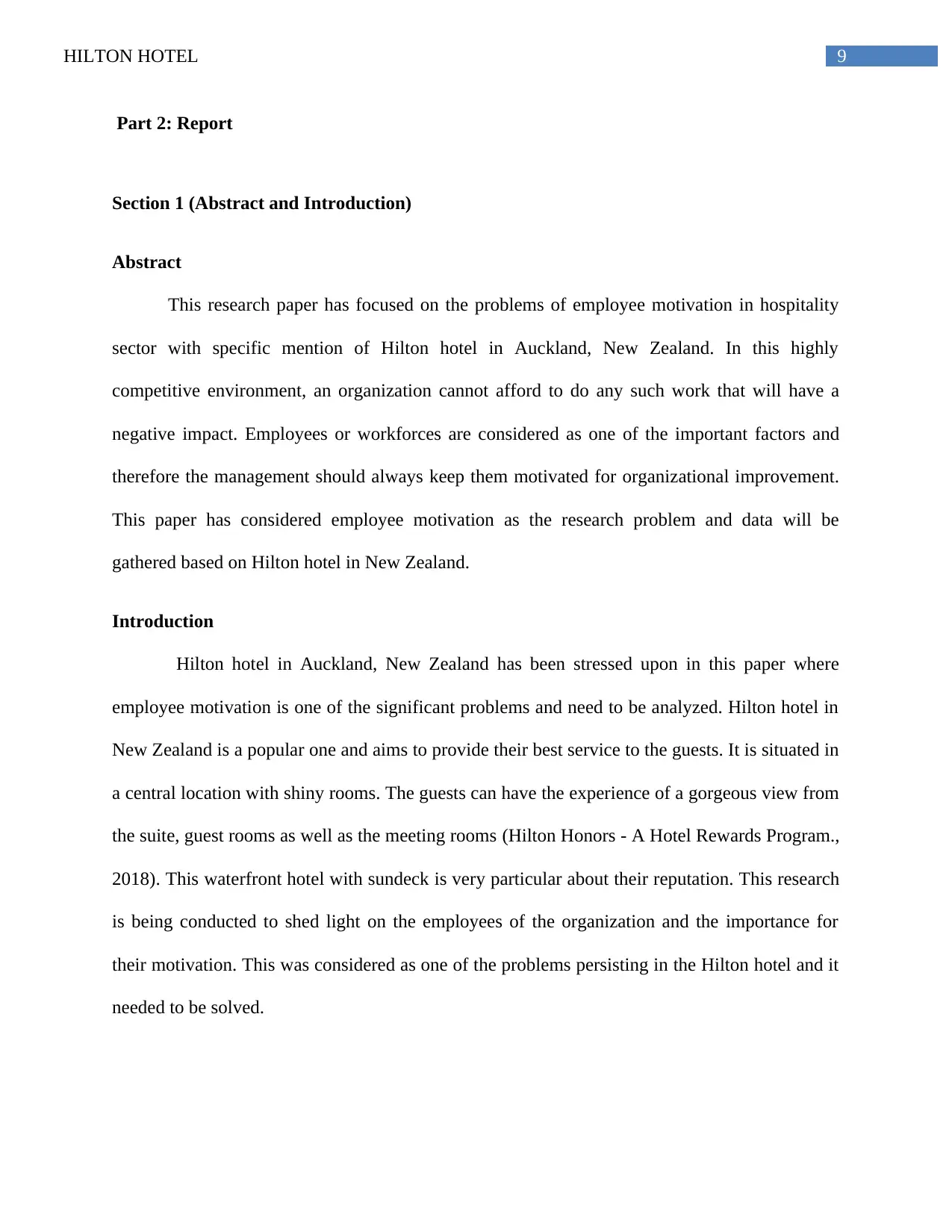
9HILTON HOTEL
Part 2: Report
Section 1 (Abstract and Introduction)
Abstract
This research paper has focused on the problems of employee motivation in hospitality
sector with specific mention of Hilton hotel in Auckland, New Zealand. In this highly
competitive environment, an organization cannot afford to do any such work that will have a
negative impact. Employees or workforces are considered as one of the important factors and
therefore the management should always keep them motivated for organizational improvement.
This paper has considered employee motivation as the research problem and data will be
gathered based on Hilton hotel in New Zealand.
Introduction
Hilton hotel in Auckland, New Zealand has been stressed upon in this paper where
employee motivation is one of the significant problems and need to be analyzed. Hilton hotel in
New Zealand is a popular one and aims to provide their best service to the guests. It is situated in
a central location with shiny rooms. The guests can have the experience of a gorgeous view from
the suite, guest rooms as well as the meeting rooms (Hilton Honors - A Hotel Rewards Program.,
2018). This waterfront hotel with sundeck is very particular about their reputation. This research
is being conducted to shed light on the employees of the organization and the importance for
their motivation. This was considered as one of the problems persisting in the Hilton hotel and it
needed to be solved.
Part 2: Report
Section 1 (Abstract and Introduction)
Abstract
This research paper has focused on the problems of employee motivation in hospitality
sector with specific mention of Hilton hotel in Auckland, New Zealand. In this highly
competitive environment, an organization cannot afford to do any such work that will have a
negative impact. Employees or workforces are considered as one of the important factors and
therefore the management should always keep them motivated for organizational improvement.
This paper has considered employee motivation as the research problem and data will be
gathered based on Hilton hotel in New Zealand.
Introduction
Hilton hotel in Auckland, New Zealand has been stressed upon in this paper where
employee motivation is one of the significant problems and need to be analyzed. Hilton hotel in
New Zealand is a popular one and aims to provide their best service to the guests. It is situated in
a central location with shiny rooms. The guests can have the experience of a gorgeous view from
the suite, guest rooms as well as the meeting rooms (Hilton Honors - A Hotel Rewards Program.,
2018). This waterfront hotel with sundeck is very particular about their reputation. This research
is being conducted to shed light on the employees of the organization and the importance for
their motivation. This was considered as one of the problems persisting in the Hilton hotel and it
needed to be solved.
Paraphrase This Document
Need a fresh take? Get an instant paraphrase of this document with our AI Paraphraser
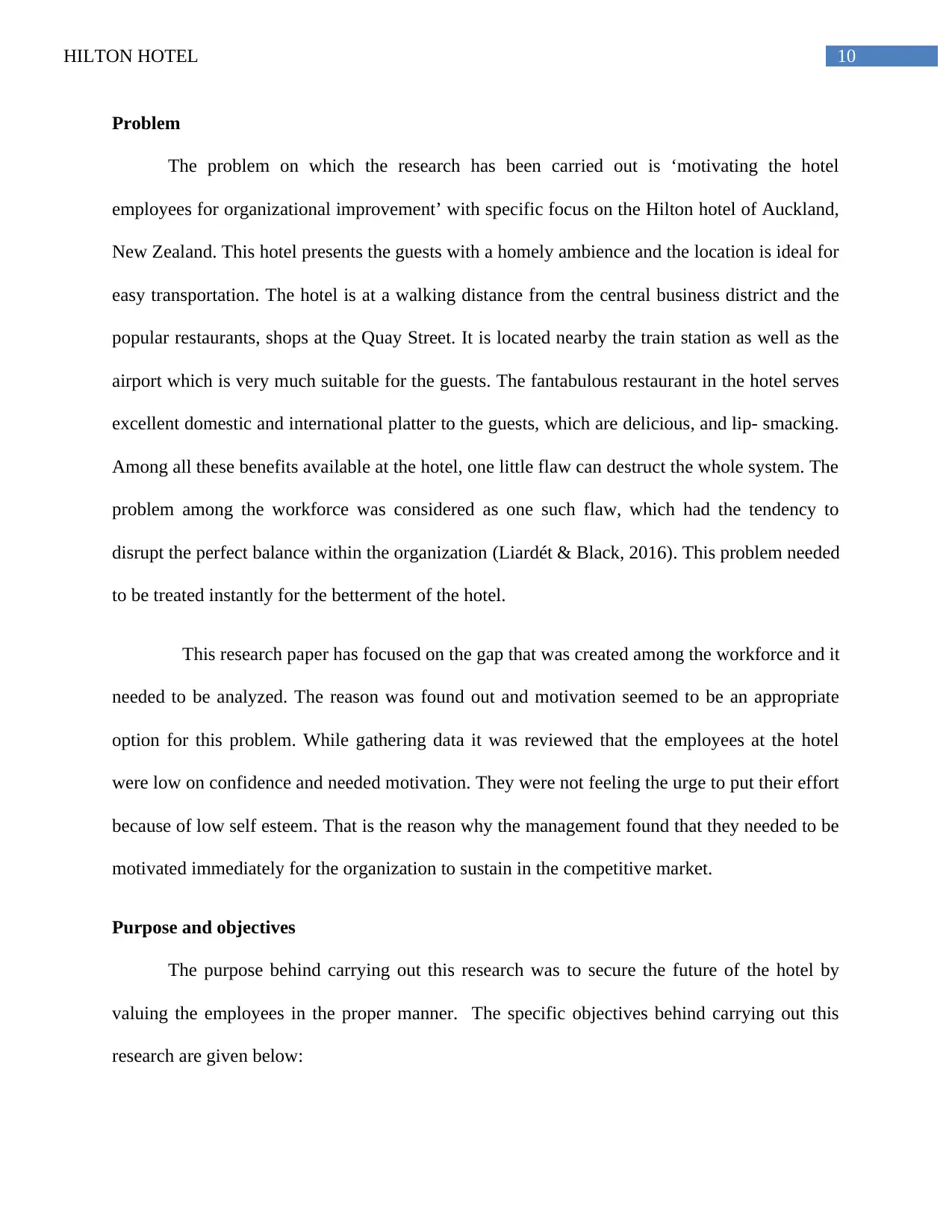
10HILTON HOTEL
Problem
The problem on which the research has been carried out is ‘motivating the hotel
employees for organizational improvement’ with specific focus on the Hilton hotel of Auckland,
New Zealand. This hotel presents the guests with a homely ambience and the location is ideal for
easy transportation. The hotel is at a walking distance from the central business district and the
popular restaurants, shops at the Quay Street. It is located nearby the train station as well as the
airport which is very much suitable for the guests. The fantabulous restaurant in the hotel serves
excellent domestic and international platter to the guests, which are delicious, and lip- smacking.
Among all these benefits available at the hotel, one little flaw can destruct the whole system. The
problem among the workforce was considered as one such flaw, which had the tendency to
disrupt the perfect balance within the organization (Liardét & Black, 2016). This problem needed
to be treated instantly for the betterment of the hotel.
This research paper has focused on the gap that was created among the workforce and it
needed to be analyzed. The reason was found out and motivation seemed to be an appropriate
option for this problem. While gathering data it was reviewed that the employees at the hotel
were low on confidence and needed motivation. They were not feeling the urge to put their effort
because of low self esteem. That is the reason why the management found that they needed to be
motivated immediately for the organization to sustain in the competitive market.
Purpose and objectives
The purpose behind carrying out this research was to secure the future of the hotel by
valuing the employees in the proper manner. The specific objectives behind carrying out this
research are given below:
Problem
The problem on which the research has been carried out is ‘motivating the hotel
employees for organizational improvement’ with specific focus on the Hilton hotel of Auckland,
New Zealand. This hotel presents the guests with a homely ambience and the location is ideal for
easy transportation. The hotel is at a walking distance from the central business district and the
popular restaurants, shops at the Quay Street. It is located nearby the train station as well as the
airport which is very much suitable for the guests. The fantabulous restaurant in the hotel serves
excellent domestic and international platter to the guests, which are delicious, and lip- smacking.
Among all these benefits available at the hotel, one little flaw can destruct the whole system. The
problem among the workforce was considered as one such flaw, which had the tendency to
disrupt the perfect balance within the organization (Liardét & Black, 2016). This problem needed
to be treated instantly for the betterment of the hotel.
This research paper has focused on the gap that was created among the workforce and it
needed to be analyzed. The reason was found out and motivation seemed to be an appropriate
option for this problem. While gathering data it was reviewed that the employees at the hotel
were low on confidence and needed motivation. They were not feeling the urge to put their effort
because of low self esteem. That is the reason why the management found that they needed to be
motivated immediately for the organization to sustain in the competitive market.
Purpose and objectives
The purpose behind carrying out this research was to secure the future of the hotel by
valuing the employees in the proper manner. The specific objectives behind carrying out this
research are given below:
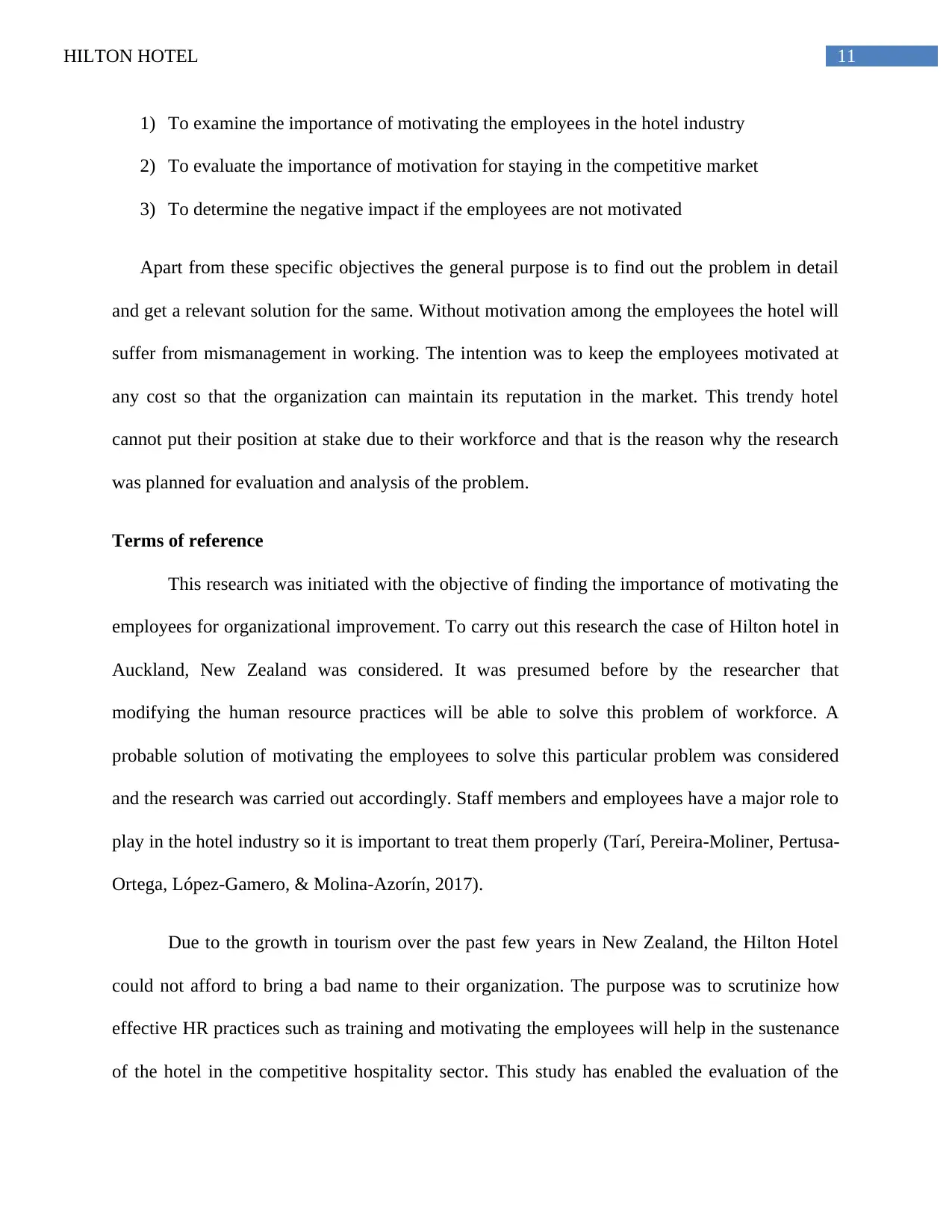
11HILTON HOTEL
1) To examine the importance of motivating the employees in the hotel industry
2) To evaluate the importance of motivation for staying in the competitive market
3) To determine the negative impact if the employees are not motivated
Apart from these specific objectives the general purpose is to find out the problem in detail
and get a relevant solution for the same. Without motivation among the employees the hotel will
suffer from mismanagement in working. The intention was to keep the employees motivated at
any cost so that the organization can maintain its reputation in the market. This trendy hotel
cannot put their position at stake due to their workforce and that is the reason why the research
was planned for evaluation and analysis of the problem.
Terms of reference
This research was initiated with the objective of finding the importance of motivating the
employees for organizational improvement. To carry out this research the case of Hilton hotel in
Auckland, New Zealand was considered. It was presumed before by the researcher that
modifying the human resource practices will be able to solve this problem of workforce. A
probable solution of motivating the employees to solve this particular problem was considered
and the research was carried out accordingly. Staff members and employees have a major role to
play in the hotel industry so it is important to treat them properly (Tarí, Pereira-Moliner, Pertusa-
Ortega, López-Gamero, & Molina-Azorín, 2017).
Due to the growth in tourism over the past few years in New Zealand, the Hilton Hotel
could not afford to bring a bad name to their organization. The purpose was to scrutinize how
effective HR practices such as training and motivating the employees will help in the sustenance
of the hotel in the competitive hospitality sector. This study has enabled the evaluation of the
1) To examine the importance of motivating the employees in the hotel industry
2) To evaluate the importance of motivation for staying in the competitive market
3) To determine the negative impact if the employees are not motivated
Apart from these specific objectives the general purpose is to find out the problem in detail
and get a relevant solution for the same. Without motivation among the employees the hotel will
suffer from mismanagement in working. The intention was to keep the employees motivated at
any cost so that the organization can maintain its reputation in the market. This trendy hotel
cannot put their position at stake due to their workforce and that is the reason why the research
was planned for evaluation and analysis of the problem.
Terms of reference
This research was initiated with the objective of finding the importance of motivating the
employees for organizational improvement. To carry out this research the case of Hilton hotel in
Auckland, New Zealand was considered. It was presumed before by the researcher that
modifying the human resource practices will be able to solve this problem of workforce. A
probable solution of motivating the employees to solve this particular problem was considered
and the research was carried out accordingly. Staff members and employees have a major role to
play in the hotel industry so it is important to treat them properly (Tarí, Pereira-Moliner, Pertusa-
Ortega, López-Gamero, & Molina-Azorín, 2017).
Due to the growth in tourism over the past few years in New Zealand, the Hilton Hotel
could not afford to bring a bad name to their organization. The purpose was to scrutinize how
effective HR practices such as training and motivating the employees will help in the sustenance
of the hotel in the competitive hospitality sector. This study has enabled the evaluation of the
⊘ This is a preview!⊘
Do you want full access?
Subscribe today to unlock all pages.

Trusted by 1+ million students worldwide
1 out of 22
Related Documents
Your All-in-One AI-Powered Toolkit for Academic Success.
+13062052269
info@desklib.com
Available 24*7 on WhatsApp / Email
![[object Object]](/_next/static/media/star-bottom.7253800d.svg)
Unlock your academic potential
Copyright © 2020–2026 A2Z Services. All Rights Reserved. Developed and managed by ZUCOL.





